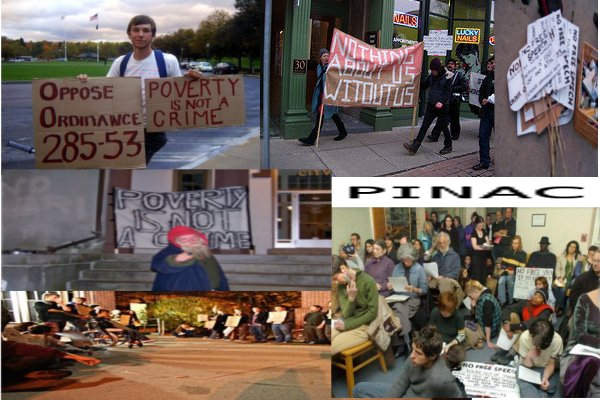
http://jackiedowd.blogspot.com/2009/04/panhandling-is-protected-by.html
The 13th Juror, a homelessness issues blog run by a poverty lawyer J. Dowd, reports on an amazing precedent--an Oregon court has ruled that a panhandling ordinance that prohibits solicitation on freeways and intersections is unconstitutional. What this means is that a court has ruled that selectively restricting panhandling in a rigorous and onerous fashion, like the ordinance here in Northampton that was recently tabled set out to do, not just criminalizing it blatantly all together, is against the principle of free speech! Of course, it was judged unconstitutional going by the Oregon Constitution, not our constitution, but it's still a good sign. The article specifically referred to in the Oregon Constitution was "Article 1, Section 8...: Freedom of speech and press. No law shall be passed restraining the free expression of opinion, or restricting the right to speak, write, or print freely on any subject whatever; but every person shall be responsible for the abuse of this right." I doubt the MA Constitution reads very differently.
Here is the original Southern Oregon Mail Tribune article that J. Dowd reports on:
http://www.mailtribune.com/apps/pbcs.dll/article?AID=/20090327/NEWS/903270331
The ACLU was involved in this case as it was in ours--in fact, one of its members filed the lawsuit. " 'I think it's important for government officials to understand that they cannot prohibit expression because they find it offensive,' said David Fidanque, executive director of the American Civil Liberties Union of Oregon." Bill Newman, our ACLU lawyer, said much the same thing here. It heartens me to know that the ACLU are concerned about the most vulnerable and perhaps the most important use of our right to free speech--the right to ask for help. And it saddens me that some citizens and businesses find these cries for help offensive.
The court did uphold the provisions about "aggressive panhandling", which is probably legally redundant as I can't imagine that Oregon doesn't have laws prohibiting harrassment just like MA does. But weeding out aggressive panhandlers wasn't the goal of the legislation in the first place, just as it wasn't the goal of the legislation here. It was just hype to make panhandlers look dangerous (despite the police's admission that the "aggressive panhandlers" were only a few individuals) and to make the legislation appear to be addressing a safety concern when it was really about rousting the poor.
Here are some of the many restrictions the legislation placed on panhandling before it was struck down. It was disallowed
--At any intersection controlled by an electronic traffic control device.
--Within 50 feet of an automated teller or financial institution.
--Public transportation vehicles or facilities.
--Public parking lots or structures.
--A queue of five or more persons waiting to gain admission to a place, or event, to purchase an item or admission ticket.
Don't these demanding requirements sound mighty familiar? (I find it particularly interesting how skittish Oregon shoppers seem to be, or at least, their police consider them to be--do they imagine that a panhandler could steal from someone withdrawing from an ATM from *fifty* feet away?) What Oregon's decision hopefully teaches the anti-panhandling crusaders is that masking de facto decriminalization as regulation does not fool the courts. As some major BID proponents have vowed to bring up the anti-panhandling ordinance before the council again, I hope they take heed.
Another thing Jacqueline Dowd blogs shows us, when we click on the "panhandling" tag in her blog and find many similar stories, is that this anti-panhandler fervor is a nationwide trend. Many of these laws have passed successfully in many states and many more have been proposed. (Luckily, though, so far none have been passed in our state, and ironically enough, supposedly progressive Northampton was the first city or town to propose such legislation.) When we fought the ordinance here, it was more than just a provincial issue. We were fighting a classist trend that has been making inroads throughout this country.

No comments:
Post a Comment